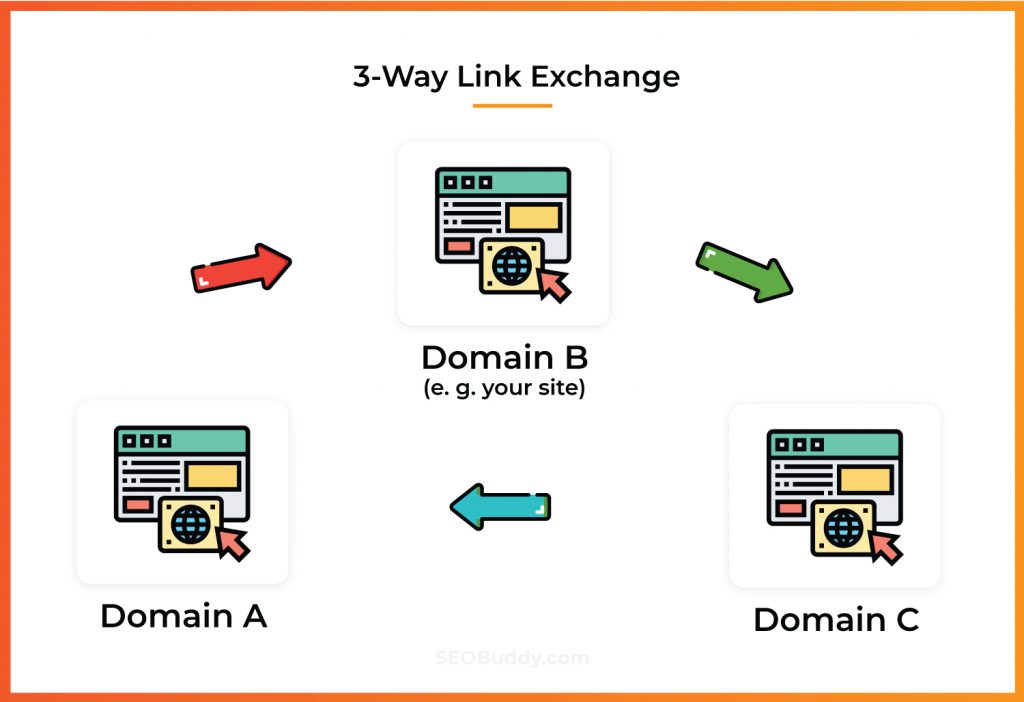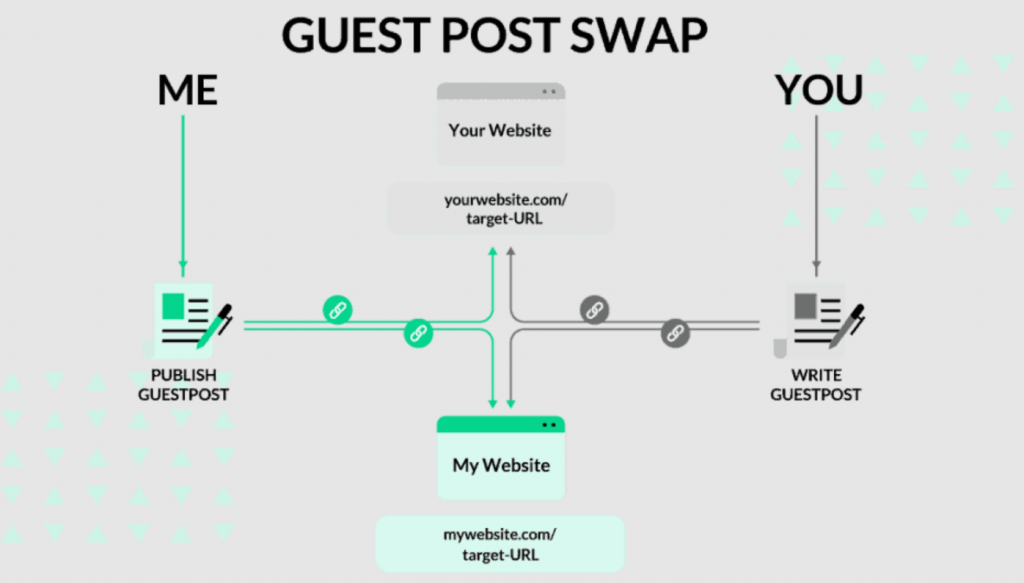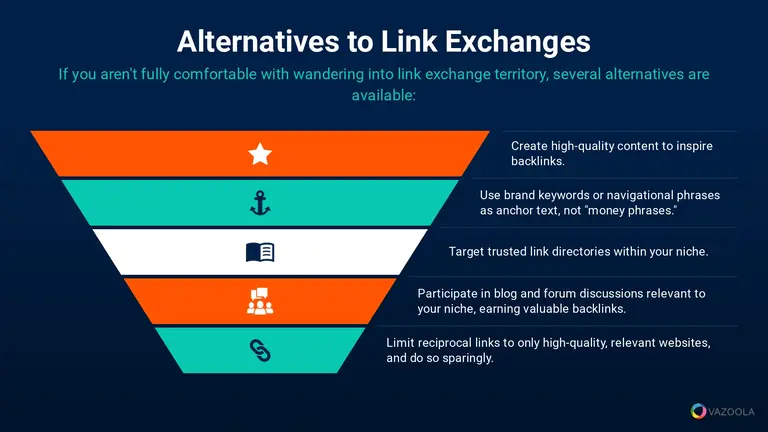Uncover the insider secrets of boosting your website’s traffic through strategic link exchanges. Don’t miss out on this powerful strategy!

Image courtesy of via DALL-E 3
Table of Contents
Introduction to Link Exchange
Link exchange is a way for websites to share links with each other to help people find more information and improve their ranking in searches. When you visit a website and see hyperlinks that lead you to other websites, that’s link exchange in action. Websites use link exchange to connect with each other and make it easier for visitors to discover new and relevant content.
What is a Link Exchange?
A link exchange is when two websites agree to share links with each other. This means that both websites will place hyperlinks to each other’s sites on their own pages. By doing this, they help each other attract more visitors and potentially improve their position in search engine results. It’s like recommending your friend’s favorite book to someone looking for a good read.
Why Do Websites Exchange Links?
Websites exchange links for many reasons. One main reason is to increase the number of visitors coming to their site. When visitors click on links leading to their site from other websites, it can make their site more popular. Additionally, exchanging links can help websites get more recognition from search engines, which can boost their visibility online. It’s like having a special marker that guides people to your favorite ice cream shop.
How Link Exchange Works
Link exchange is a way for websites to collaborate with each other by sharing hyperlinks on their pages. This helps users discover more information and also boosts the websites’ visibility in online searches.
Finding Link Exchange Partners
Website owners search for other sites interested in exchanging links by reaching out to each other. They look for partners whose content complements their own and who are willing to collaborate in this way.
Agreeing on the Exchange
Once websites find suitable partners, they agree to place each other’s links on their pages. This mutual agreement helps both sites attract more visitors and improve their online presence.
Adding and Checking Links
After agreeing on the exchange, website owners proceed to add hyperlinks to their pages. They ensure that the links are placed correctly and are functioning properly by regularly checking them to maintain a smooth user experience.
Types of Link Exchange
When websites decide to exchange links, there are different ways they can do it. Let’s explore the various types of link exchange:

Image courtesy of via Google Images
Reciprocal Links
Reciprocal links are when two websites agree to link to each other. It’s like a friendly handshake between sites, helping each other out by sharing visitors and boosting their search engine rankings.
One-Way Links
One-way links occur when a website links to another without expecting a link back. This type of link exchange is like a one-sided gift, where one site benefits from increased traffic and improved visibility.
Multi-Way Links
Multi-way links involve several websites agreeing to link to each other in a group. It’s like a web of connections, where each site supports one another by sharing links and expanding their reach.
Understanding these different types of link exchanges can help website owners choose the best approach to enhance their online presence and connect with a wider audience.
Benefits of Link Exchange
One of the biggest benefits of link exchange for websites is the opportunity to increase traffic. When websites share links with each other, people who visit one site may click on the link to visit the other site as well. This means more visitors for both websites, helping them reach a larger audience.
Better SEO
Another significant advantage of link exchange is the boost it gives to Search Engine Optimization (SEO). Search engines like Google look at the number of quality links pointing to a website to determine its relevance and authority. By exchanging links with other reputable sites, a website can improve its ranking in search results, making it more visible to potential visitors.
Challenges with Link Exchange
One of the challenges that websites face with link exchanges is the presence of spam links. These are links from low-quality or irrelevant websites that may harm the reputation and credibility of a website. It’s important for website owners to carefully vet the links they exchange to avoid being associated with spammy websites.

Image courtesy of via Google Images
Low-Quality Links
Not all links are created equal, and some may not provide any tangible benefits to a website. Websites engaging in link exchanges may receive links from low-quality sites that do not contribute positively to their SEO efforts. It’s crucial for website owners to prioritize quality over quantity when exchanging links to ensure the links are beneficial.
Penalties from Search Engines
Search engines like Google have strict guidelines regarding link building practices. If a website is found to be engaging in manipulative link schemes or exchanging links solely for the purpose of improving search rankings, it may face penalties such as a drop in search engine rankings or even removal from search results. Website owners must be cautious and follow ethical link exchange practices to avoid repercussions from search engines.
Best Practices for Link Exchange
Link exchange is a great way for websites to connect with each other and improve their online visibility. However, it’s important to follow some best practices to ensure that the link exchange is beneficial and doesn’t have any negative consequences. Here are some key tips to keep in mind:
Choosing Quality Links
When exchanging links with other websites, it’s crucial to focus on quality over quantity. Make sure that the websites you are linking to are reputable, trustworthy, and have relevant content. Links from high-quality sites will not only benefit your SEO but also enhance your own website’s credibility.
Relevance of Links
It’s essential to exchange links with websites that are relevant to your own content. Linking to sites that are in the same industry or niche as yours will not only provide value to your visitors but also signal to search engines that your website is an authority in that particular field. This can ultimately boost your SEO rankings.
Natural Linking
When adding links to your website, make sure to do so in a way that feels natural to your readers. Avoid overloading your content with too many links or using aggressive anchor text. Instead, integrate links seamlessly within your content where they genuinely add value and context for your audience.
Tools for Managing Link Exchange
In the world of website link exchange, it’s crucial for website owners to have the right tools to keep track of their link partnerships and ensure everything is running smoothly. Here are some simple tools that can help website owners manage their link exchanges effectively:

Image courtesy of via Google Images
Link Management Tools
Link management tools are essential for keeping track of all the link exchanges a website is involved in. These tools help website owners organize their link partners, monitor link placement, and ensure that all links are active and working properly. Some popular link management tools include Ahrefs, SEMrush, and Moz.
Monitoring Tools
Monitoring tools play a vital role in ensuring that the links exchanged between websites are still active and functioning as intended. These tools help website owners check the status of their links regularly, identify any broken links, and address any issues that may arise. Examples of monitoring tools include Google Search Console, Broken Link Checker, and Screaming Frog.
Conclusion
In conclusion, link exchange is a beneficial practice for website owners looking to increase traffic, improve SEO rankings, and make their sites more popular. By sharing links with other websites, they can attract more visitors and boost their online presence. However, it’s essential to be cautious and follow best practices to avoid potential challenges like spam links, low-quality links, and penalties from search engines.
Key Takeaways
Remember that link exchange:
- Helps websites increase traffic and popularity.
- Provides a boost in SEO rankings.
- Requires exchanging links with quality and relevant sites.
- Can be done safely and effectively with proper management and monitoring tools.
Frequently Asked Questions (FAQs)
What is a link exchange?
A link exchange is when websites share links with each other to help people find more information and to improve their ranking in searches. It’s like friends recommending each other’s favorite books to others!
Why is link exchange important?
Link exchange is important for websites because it helps increase visitors and makes the site more popular. Just like telling your friends about a cool new video game, sharing links helps more people discover a website.
Is link exchange safe?
Yes, link exchange is safe if done properly and responsibly. Websites should only exchange links with trustworthy sites and avoid spammy or low-quality links. It’s like making sure you only share your toys with friends who will take good care of them!







